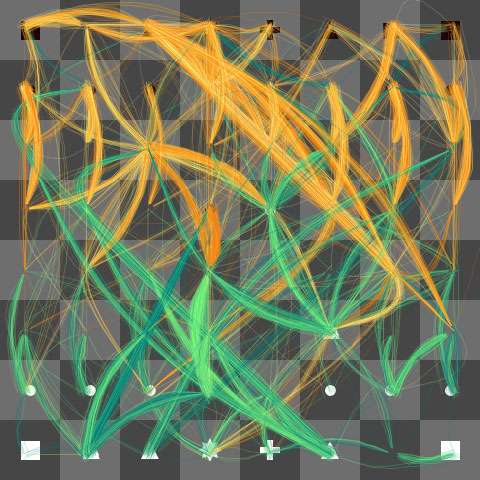After great comments and good conversations, i want to take a second stab at explaining the shift i was asking for wrt copyright and remix. My argument is that we stop thinking of remix as production, but as active consumption. Remix happens as a bi-product of consumption. What we’re remixing is culture and the active consumption of culture is part of identity development and living as a social creature in society.
Think about clothing consumption. Few people buy all of the items on the mannequin. You buy different pieces and mix and mash them. You might even decide to alter them by adding patches, by dying them, by cutting them up. You make the clothing yours. And then you share your consumption with the world by parading on the streets. In this way, you make the clothing tell your story. (tx Kevin Bjorke)
Think about IKEA consumption. Isn’t it great that they lay out entire rooms for you to look at? Do any of you have rooms that are exactly like the ones in IKEA? You take furniture, you mix and mash it up until it suits you. You may paint it, you may add a different bedspread, you’ll add your own books. You then invite your friends over to show them what you’ve done.
Are you expected to consume clothing or IKEA exactly as prescribed? No. These items are made to be personalized, made to be altered to meet your needs.
So what is fan fiction? I take a story and i alter it to tell my story. What is hip hop remix? I take a bunch of different sounds and put them together in a way not prescribed by the mannequin.
From clothing to songs, we consume and we connect it to our lives. We’ve always done this with media. We’ve made collages out of magazines, we’ve put together pieces of songs in a new sequence for our friends. Of course, now, the cultural bits that we consume are more accessible Lego blocks. It’s possible to play with them in new ways. And there are so many more choices that we can be really creative with that play. We can consume culture in new ways and what we shit out in that process actually gets to be digested and mixed together with other bits of culture that we consumed.
There’s a problem though and that has to do with distribution. When i parade around the public square in my remix of the Gap and Nike (well,…), i am sharing my remix with the world. Yet, there’s nothing persistent or searchable about it. What happens when my friends snap a photo of me? They are making the remix more permanent but, still, no one from those megacorps sees what i’ve done. What happens when my friends sell that picture to the tabloids for a bazillion dollars because Britney and her new baby are also in the photo? And they are also wearing a different remix of various megabrands? I wasn’t remixing clothing for distribution. Of course, even that does happen. Ever seen pictures of celebrities in magazines where it says the top was made by Ralph Lauren and the skirt was made by Versace or whatever?
When Jonah Peretti sent his conversation with Nike to a few friends, was he distributing it? What about when it got forwarded to millions of people and got him spots on TV? In digital world, our intentions and the potential results might not be the same. You might be speaking to six people in your blog. It might feel like the town square but what happens when millions of people apparate there like it’s a Quidditch match? Only witches know this instant appearance of beyond imaginable audiences with some of them under invisibility cloaks. Yet, online, we’re living like witches. Is it distribution when we’re performing to beyond imaginable publics and lots of people are taking pictures?
What about when we’re intending to share to our friends just like we’ve always done? Why do corporate interests get to tell us that our sharing with our friends is now bad even though we’ve ALWAYS done it? Is this only because they get to be the voyeur in the room? Who gave them that right? Sure, it’s a new public, but yuck. I can’t imagine growing up with a RIAA rep perched in my school bathroom.
A huge part of the identity process is to consume culture, mix it and personalize it, and share that with our friends because it has identity implications. We even share in public so that we can get parents to scrunch up their noses. Just because technology puts the elephant in every room imaginable, why do we have to accept their dictation of how we should consume their products? Why can’t we consume for identity, for culture, for life? Why can’t we recognize that remixes are active consumption where we’ve made culture personal and for our friends? We live in a world where accidental distribution is always possible, where everyone has the potential to be a celebrity in public – everyone wants to copy them. That’s weird. But that doesn’t mean that the acts we’re doing aren’t what we’ve always done. We just have different technologies now but the practice hasn’t changed.
“You are bidding on a mistake” is the beginning of the description for the auction of these leather pants on eBay. The description goes on to explain how this man came to make the mistake of buying these pants (involves a girl) and why you should buy these pants (because you’re into Queen, a rock star, gay, a biker or a Frenchman). There’s nothing better to make you smile than to read someone’s creative approach to trying to sell their crap.
 Yesterday,
Yesterday,